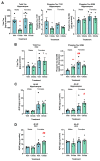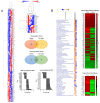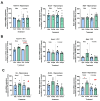Low-Dose Chidamide Treatment Displays Sex-Specific Differences in the 3xTg-AD Mouse
- PMID: 37759724
- PMCID: PMC10526199
- DOI: 10.3390/biom13091324
Low-Dose Chidamide Treatment Displays Sex-Specific Differences in the 3xTg-AD Mouse
Abstract
Epigenetic compounds have become attractive small molecules for targeting the multifaceted aspects of Alzheimer's disease (AD). Although AD disproportionately affects women, most of the current literature investigating epigenetic compounds for the treatment of AD do not report sex-specific results. This is remarkable because there is rising evidence that epigenetic compounds intrinsically affect males and females differently. This manuscript explores the sexual dimorphism observed after chronic, low-dose administration of a clinically relevant histone deacetylase inhibitor, chidamide (Tucidinostat), in the 3xTg-AD mouse model. We found that chidamide treatment significantly improves glucose tolerance and increases expression of glucose transporters in the brain of males. We also report a decrease in total tau in chidamide-treated mice. Differentially expressed genes in chidamide-treated mice were much greater in males than females. Genes involved in the neuroinflammatory pathway and amyloid processing pathway were mostly upregulated in chidamide-treated males while downregulated in chidamide-treated females. This work highlights the need for drug discovery projects to consider sex as a biological variable to facilitate translation.
Keywords: 3xTg-AD mouse; Alzheimer’s; HDAC inhibitor; epigenetics; sex differences.
Conflict of interest statement
The authors declare no conflict of interest.
Figures




References
-
- Volmar C.-H., Wahlestedt C. Histone Deacetylases (HDACs) and Brain Function. Neuroepigenetics. 2015;1:20–27. doi: 10.1016/j.nepig.2014.10.002. - DOI
-
- German Center for Neurodegenerative Diseases (DZNE) Multicenter, Open-Label Phase Ib Dose-Escalation and Dose-Confirmational Study for the Tolerability and Safety of N-Hydroxy-N’-Phenyl-Octanediamide (Vorinostat) in Patients With Mild Alzheimer’s Disease. ClinicalTrials.gov; Bethesda, MD, USA: 2019.
-
- Amylyx Pharmaceuticals Inc. Phase II Study to Assess the Safety, Tolerability, and Target Engagement of AMX0035, a Fixed Combination of Sodium Phenylbutyrate and Tauroursodeoxycholic Acid for the Treatment of Alzheimer’s Disease. ClinicalTrials.gov; Bethesda, MD, USA: 2021.
Publication types
MeSH terms
Substances
Grants and funding
LinkOut - more resources
Full Text Sources
Medical
Molecular Biology Databases

